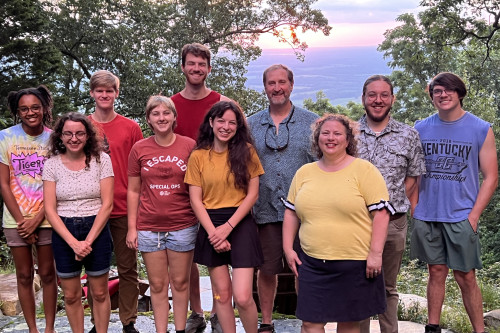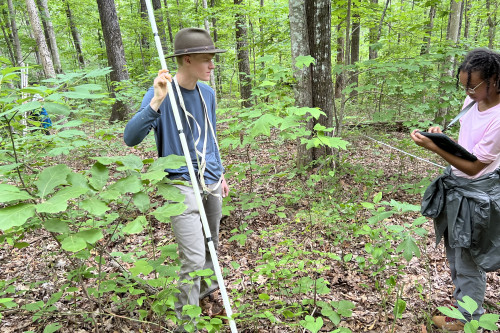U.S. Department of Agriculture research grant supports Sewanee biology faculty, alumni, and Block Fellows to continue long-term study of Cumberland Plateau forests.
 Sewanee Professor of Biology Jon Evans and a former student, Tennessee State University professor and forest ecologist Sarah McCarthy Neumann, C’99, have been awarded a $500,000 research grant from the U.S. Department of Agriculture to continue and expand their research on the ecology of upland forests of the Cumberland Plateau.
Sewanee Professor of Biology Jon Evans and a former student, Tennessee State University professor and forest ecologist Sarah McCarthy Neumann, C’99, have been awarded a $500,000 research grant from the U.S. Department of Agriculture to continue and expand their research on the ecology of upland forests of the Cumberland Plateau.
Since 1995, Evans and his students have been conducting research on a series of long-term plots in Franklin State Forest and Fall Creek Falls State Park established by the Tennessee Valley Authority (TVA) in the 1970s. At 10-year intervals, teams of Sewanee students, overseen by Evans, have mapped every tree in these plots down to the sapling level and have followed their fates over time in an attempt to understand how these forests are changing. The new grant will allow the researchers to expand the scope of the project to examine how mycorrhizal fungi influence the distribution and abundance of tree species.
This past summer, Evans and Neumann embarked on a full re-census of the plots with student crews from both Sewanee and TSU. The field crew leader this past summer was Izzy Schutte, Neuman’s Ph.D. student, and the Sewanee team was composed of Block Fellows Oliver Hutchens, C’23, J.T. Michel, C’24, Rob Phillips, C’25, and Keegan Congleton, C’25. The forest plots (totaling 25 acres) now represent the longest-running, large-scale forest dynamics study of its kind on the Cumberland Plateau.
 Evans inherited the original plot data from Emeritus Professor of Biology George Ramseur, who was contracted by the TVA to do the first census back in 1976. The lives of trees play out over long periods of time, so it takes a multigenerational commitment to research to unlock their secrets. Now, after almost 40 years of continuous study by Sewanee biology faculty, students and alumni, these plots are allowing researchers to understand the importance of old-growth upland forests to the maintenance of biological diversity on the Cumberland Plateau and the critical role they now play in combating climate change by sequestering and storing large amounts of carbon.
Evans inherited the original plot data from Emeritus Professor of Biology George Ramseur, who was contracted by the TVA to do the first census back in 1976. The lives of trees play out over long periods of time, so it takes a multigenerational commitment to research to unlock their secrets. Now, after almost 40 years of continuous study by Sewanee biology faculty, students and alumni, these plots are allowing researchers to understand the importance of old-growth upland forests to the maintenance of biological diversity on the Cumberland Plateau and the critical role they now play in combating climate change by sequestering and storing large amounts of carbon.

